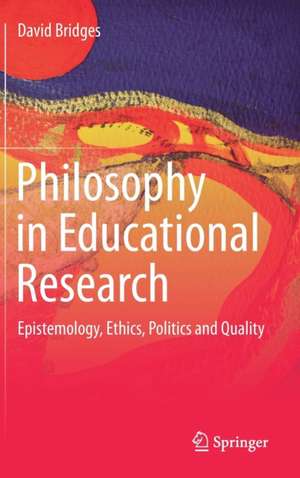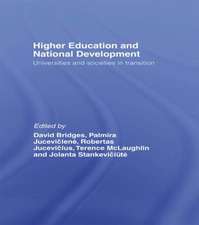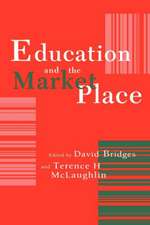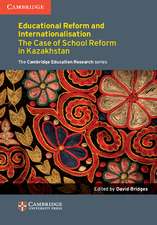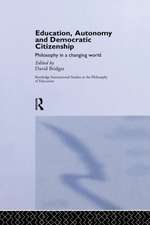Philosophy in Educational Research: Epistemology, Ethics, Politics and Quality
Autor David Bridgesen Limba Engleză Hardback – 14 dec 2016
The book discusses these familiar themes using less predictable sources and points of reference, such as: codes of social obligation in contemporary Egypt and New Zealand; the ‘Soviet’, and the inspiration of the nineteenth-century philosopher, Abai in contemporary Kazakhstan; seventeenth-century France, Pascal, and the disputes between Jesuits and Jansenites; eighteenth-century Italy, Giambattista Vico, and la scienzia nuova; ‘educational magic’ in traditional Ethiopia; and ends at a banquet with Socrates and dinner with wine and a conversation-loving Montaigne.
| Toate formatele și edițiile | Preț | Express |
|---|---|---|
| Paperback (1) | 790.77 lei 6-8 săpt. | |
| Springer International Publishing – 4 iul 2018 | 790.77 lei 6-8 săpt. | |
| Hardback (1) | 796.93 lei 6-8 săpt. | |
| Springer International Publishing – 14 dec 2016 | 796.93 lei 6-8 săpt. |
Preț: 796.93 lei
Preț vechi: 971.87 lei
-18% Nou
Puncte Express: 1195
Preț estimativ în valută:
152.53€ • 158.62$ • 127.63£
152.53€ • 158.62$ • 127.63£
Carte tipărită la comandă
Livrare economică 15-29 martie
Preluare comenzi: 021 569.72.76
Specificații
ISBN-13: 9783319492100
ISBN-10: 3319492101
Pagini: 375
Ilustrații: XIX, 479 p. 1 illus.
Dimensiuni: 155 x 235 x 27 mm
Greutate: 0.87 kg
Ediția:1st ed. 2017
Editura: Springer International Publishing
Colecția Springer
Locul publicării:Cham, Switzerland
ISBN-10: 3319492101
Pagini: 375
Ilustrații: XIX, 479 p. 1 illus.
Dimensiuni: 155 x 235 x 27 mm
Greutate: 0.87 kg
Ediția:1st ed. 2017
Editura: Springer International Publishing
Colecția Springer
Locul publicării:Cham, Switzerland
Cuprins
1. Educational Research and Philosophy in ‘Interesting Times’.- PART 1: Educational Research and its Intellectual Resources.- 2. The Disciplines and Discipline of Educational Research.- 3. ‘Two Cultures’ Revisited: Science (‘Scientism’) and the Humanities in the Construction of Educational Understanding.- 4. ‘The Proper Study of Mankind …’? In Defence of the Humanities Against the Ambitions of ‘Scientific’ Psychology.- PART 2: Education as Applied Research: Practice and Policy.- 5. Educational Research and Practice.- 6. Educational Research and Policy.- PART 3: Philosophy and Educational Research.- 7. Philosophising about, as, and in Educational Research.- 8. Philosophy and Practice: A Philosopher in the Classroom?.- 9. A Philosopher at Court? A Reflection on an Educational Researcher’s Engagement with Policymakers.- 10. The Roles of ‘the Philosopher’ in an Interdisciplinary Research Group.- 11. From Philosophising about Educational Research to Researching Philosophy: Reflections on a Reflective Log.- PART 4: Truth(s) in Educational Research.- 12. Educational Research: Pursuit of Truth or Flight into Fancy?- 13. Educational Theory, Practice, and Research: Pragmatic Perspectives.- 14. n=1: The Science and Art of the Single Case in Educational Research.- 15. Narratives, Fiction, and the Magic of the Real.- 16. History, Fiction, and Educational Research.- 17. Interpreting the International and Intranational ‘Translation’ of Educational Policy and Practice: A Case of Opportunism, Serendipity, and Bricolage.- PART 5: Ethics and Educational Research.- 18. Four Issues for Ethical Code Makers.- 19. Research for Sale? Epistemic, Moral, and Political Drift through the Commodification of Educational Research.- 20. ‘Nothing About us Without us’: The Ethics of Outsider Research.- 21. Working Without Shame in International Educational Research and Development? From Consequentialism to Casuistry.- 22. Ethics and Epistemology in Educational Research: Research as ‘Fiction Written Under Oath’?- PART 6: Research Quality and its Assessment.- 23. Generic Criteria of Quality in Educational Research.- 24. The International and the Excellent in Educational Research and its Assessment.- 25. Research Quality Assessment: Impossible Science, Possible Art?.- EPILOGUE.- 26. Conversation in the Construction and Representation of Educational Research.
Notă biografică
David Bridges has been a leading contributor to philosophy of education for several decades. He served as Chair of the Philosophy of Education Society of Great Britain and was subsequently elected as an Honorary Vice President. In his efforts to build bridges to the mainstream educational research communities he co-founded and for several years convened the philosophy of education network of the European Education Research Association and the philosophy of education Special Interest Group of the British Education Research Association. He has published extensively in philosophical journals including the Journal of Philosophy of Education, Educational Theory, and Ethics and Education.
In parallel with this philosophical work he has developed a substantial programme of empirical and multidisciplinary research, has directed or codirected some 28 research and/or evaluation projects over the last thirty years, including several international collaborations and was most recently Director of Research (Kazakhstan and Mongolia) in the University of Cambridge Faculty of Education. He sat for six years as a Council member of both the British and the European Education Research Associations, was elected as a Fellow of the UK Academy of Social Sciences and an overseas Fellow
In parallel with this philosophical work he has developed a substantial programme of empirical and multidisciplinary research, has directed or codirected some 28 research and/or evaluation projects over the last thirty years, including several international collaborations and was most recently Director of Research (Kazakhstan and Mongolia) in the University of Cambridge Faculty of Education. He sat for six years as a Council member of both the British and the European Education Research Associations, was elected as a Fellow of the UK Academy of Social Sciences and an overseas Fellow
Textul de pe ultima copertă
This book provides critical and reflective discussions of a wide range of issues arising in education at the interface between philosophy, research, policy and practice. It addresses epistemological questions about the intellectual resources that underpin educational research, explores the relationship between philosophy and educational research, and examines debates about truth and truthfulness in educational research. Furthermore, it looks at issues to do with the relationship between research, practice and policy, and discusses questions about ethics and educational research. Finally, the book delves into the deeply contested area of research quality assessment. The book is based on extensive engagement in empirically based educational research projects and in the institutional and professional management of research, as well as in philosophical work. It clarifies what is at stake in international debates around educational research and teases out the nature of the arguments, and, where argument permits, the conclusions to which these point.
The book discusses these familiar themes using less predictable sources and points of reference, such as: codes of social obligation in contemporary Egypt and New Zealand; the ‘Soviet’, and the inspiration of the nineteenth-century philosopher, Abai in contemporary Kazakhstan; seventeenth-century France, Pascal, and the disputes between Jesuits and Jansenites; eighteenth-century Italy, Giambattista Vico, and la scienzia nuova; ‘educational magic’ in traditional Ethiopia; and ends at a banquet with Socrates and dinner with wine and a conversation-loving Montaigne.
Caracteristici
The most wide-ranging and comprehensive book in the field
Shows engagement in the execution, direction, and management of educational research and reflection on this experience
Clearly written and accessible to all sections of the education research community
Extensive use of international references
Shows engagement in the execution, direction, and management of educational research and reflection on this experience
Clearly written and accessible to all sections of the education research community
Extensive use of international references
